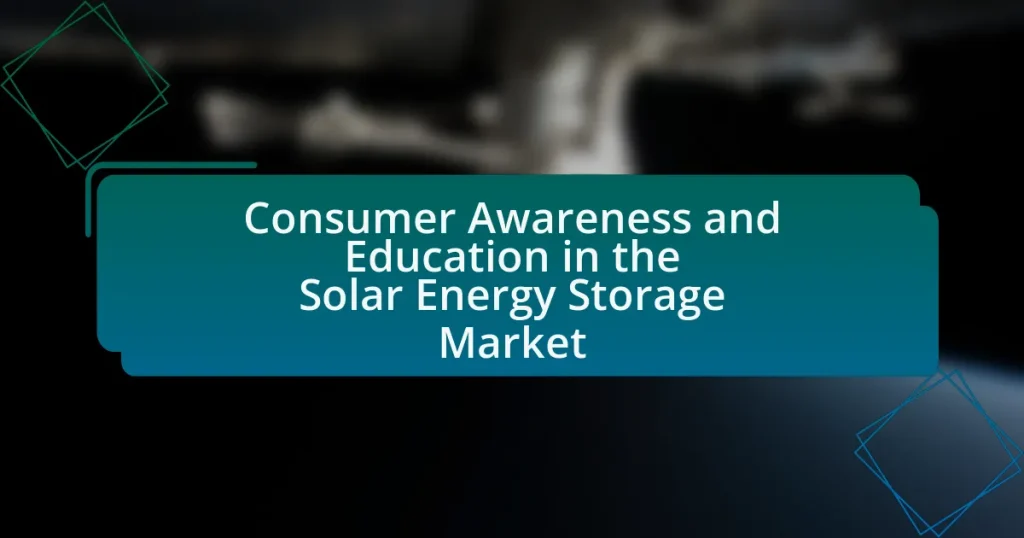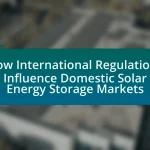Consumer awareness and education in the solar energy storage market are essential for enabling informed decision-making regarding the purchase and use of solar energy systems. This article explores the significance of consumer knowledge in driving adoption rates, the impact of education on purchasing decisions, and the challenges consumers face in understanding solar technologies. Key components of effective consumer education, including necessary information about system specifications and financial incentives, are discussed, along with strategies to enhance awareness through community programs and online resources. The article also addresses common misconceptions and the role of reliable information in shaping consumer choices, ultimately highlighting the benefits of increased awareness for market growth and product quality in the solar energy storage sector.
What is Consumer Awareness and Education in the Solar Energy Storage Market?
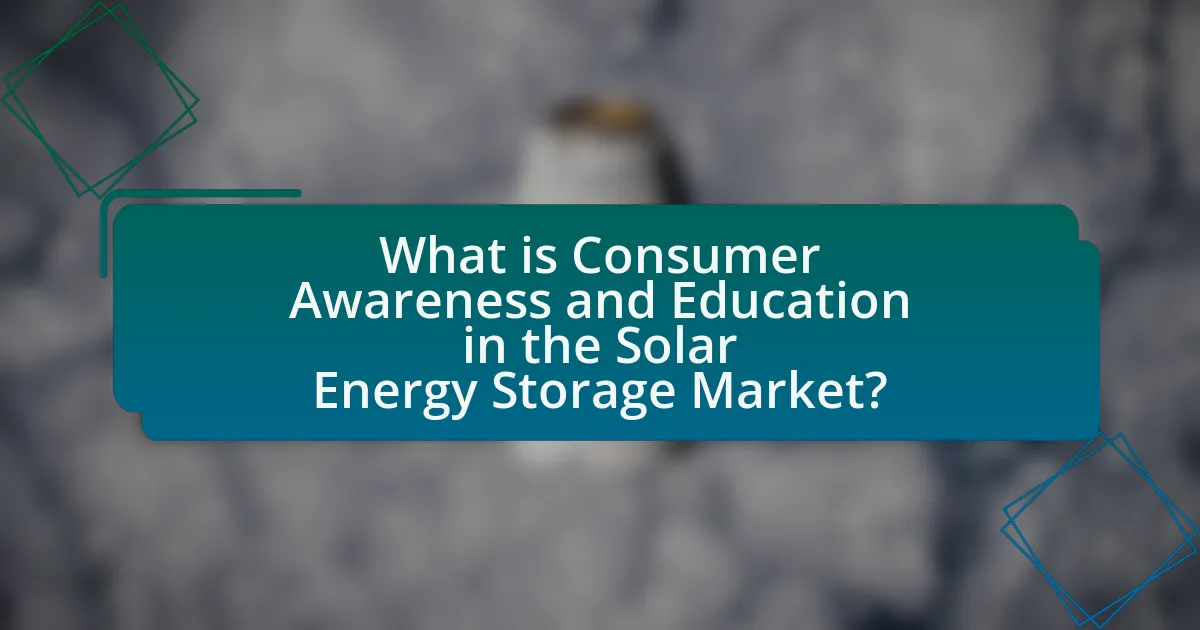

Consumer awareness and education in the solar energy storage market refer to the understanding and knowledge that consumers possess regarding solar energy systems and their storage solutions. This awareness is crucial as it empowers consumers to make informed decisions about purchasing, installing, and utilizing solar energy storage technologies. Research indicates that informed consumers are more likely to adopt solar solutions, as they comprehend the benefits, costs, and operational aspects of these systems. For instance, a study by the National Renewable Energy Laboratory found that increased consumer education can lead to a 20% rise in solar adoption rates, highlighting the importance of awareness initiatives in promoting sustainable energy practices.
Why is consumer awareness important in the solar energy storage market?
Consumer awareness is crucial in the solar energy storage market because it empowers individuals to make informed decisions about their energy options. Informed consumers are more likely to understand the benefits of solar energy storage, such as cost savings and energy independence, leading to increased adoption rates. According to a report by the International Renewable Energy Agency, consumer knowledge directly influences market growth, as educated consumers are more likely to invest in solar technologies, driving innovation and competition within the industry.
How does consumer awareness impact purchasing decisions?
Consumer awareness significantly influences purchasing decisions by enabling individuals to make informed choices based on knowledge of products, services, and their implications. When consumers are aware of the benefits and features of solar energy storage systems, they are more likely to consider these products as viable options for their energy needs. Research indicates that informed consumers tend to prioritize sustainability and cost-effectiveness, leading to increased demand for solar energy solutions. For instance, a study by the International Renewable Energy Agency found that consumer awareness of renewable energy options directly correlates with higher adoption rates of solar technologies, demonstrating that knowledge empowers consumers to choose environmentally friendly and economically beneficial products.
What role does education play in enhancing consumer awareness?
Education plays a crucial role in enhancing consumer awareness by providing individuals with the knowledge necessary to make informed decisions about products and services. In the context of the solar energy storage market, education equips consumers with an understanding of technology, benefits, and potential savings associated with solar energy systems. Research indicates that informed consumers are more likely to engage in sustainable practices and invest in renewable energy solutions, leading to increased adoption rates. For instance, a study by the National Renewable Energy Laboratory found that consumers who received educational resources about solar energy were 50% more likely to consider purchasing solar systems compared to those who did not receive such information. This demonstrates that education directly influences consumer behavior and awareness in the solar energy sector.
What are the key components of consumer education in this market?
The key components of consumer education in the solar energy storage market include understanding technology, financial incentives, installation processes, and maintenance requirements. Consumers need to grasp how solar energy storage systems function, including battery types and their efficiencies, to make informed decisions. Financial incentives, such as tax credits and rebates, are crucial for consumers to evaluate the economic benefits of investing in solar storage. Knowledge about the installation process helps consumers understand timelines, costs, and potential disruptions. Lastly, awareness of maintenance requirements ensures consumers can sustain system performance over time, maximizing their investment.
What types of information do consumers need about solar energy storage?
Consumers need information about the capacity, efficiency, lifespan, and cost of solar energy storage systems. Understanding capacity helps consumers determine how much energy can be stored for later use, while efficiency indicates how effectively the system converts and retains energy. Lifespan informs consumers about the longevity of the storage solution, which affects long-term investment decisions. Cost details, including initial investment and potential savings on energy bills, are crucial for evaluating the financial feasibility of solar energy storage. Additionally, consumers benefit from information on installation requirements, maintenance needs, and available incentives or rebates, which can influence their purchasing decisions.
How can consumers evaluate different solar energy storage options?
Consumers can evaluate different solar energy storage options by comparing key factors such as capacity, efficiency, lifespan, warranty, and cost. Capacity indicates how much energy the storage system can hold, typically measured in kilowatt-hours (kWh), which helps consumers determine if it meets their energy needs. Efficiency reflects how much of the stored energy can be used, with higher percentages indicating better performance. Lifespan, often expressed in years or cycles, informs consumers about the longevity of the system, while warranty terms provide insight into the manufacturer’s confidence in their product. Cost analysis should include both upfront expenses and potential savings over time, allowing consumers to assess the overall value. By examining these criteria, consumers can make informed decisions that align with their energy requirements and financial considerations.
What challenges do consumers face in understanding solar energy storage?
Consumers face several challenges in understanding solar energy storage, primarily due to the complexity of technology and varying product specifications. The technical jargon associated with solar energy systems, such as battery chemistry, capacity, and efficiency ratings, can be overwhelming for individuals without a background in energy systems. Additionally, consumers often struggle to compare different storage solutions because of inconsistent metrics and performance data across manufacturers. A study by the National Renewable Energy Laboratory highlights that 70% of consumers lack sufficient knowledge about energy storage options, which hinders informed decision-making. Furthermore, the rapidly evolving nature of solar technology means that consumers may find it difficult to keep up with the latest advancements and best practices, leading to confusion and potential misinformed choices.
What common misconceptions exist about solar energy storage systems?
Common misconceptions about solar energy storage systems include the belief that they are only necessary for off-grid living, that they are prohibitively expensive, and that they require constant maintenance. Many consumers think that solar energy storage is only beneficial for those who are not connected to the grid; however, grid-tied systems can also provide significant advantages, such as energy independence and cost savings during peak demand. Additionally, while the initial investment in solar storage can be high, prices have decreased significantly over the past decade, making them more accessible. According to the U.S. Department of Energy, the cost of lithium-ion batteries has dropped by about 89% since 2010. Lastly, the misconception that solar energy storage systems require extensive maintenance is inaccurate; most modern systems are designed to be low-maintenance, with warranties often lasting 10 to 25 years.
How can misinformation affect consumer choices?
Misinformation can significantly distort consumer choices by leading individuals to make decisions based on inaccurate or misleading information. For instance, consumers may overestimate the costs or underestimate the benefits of solar energy storage systems due to false claims circulated through social media or unverified sources. A study by the Pew Research Center found that 64% of Americans believe misinformation has caused confusion about important issues, including energy choices. This confusion can result in consumers opting for less efficient or more expensive alternatives, ultimately hindering the adoption of beneficial technologies like solar energy storage.
How can consumer awareness be improved in the solar energy storage market?
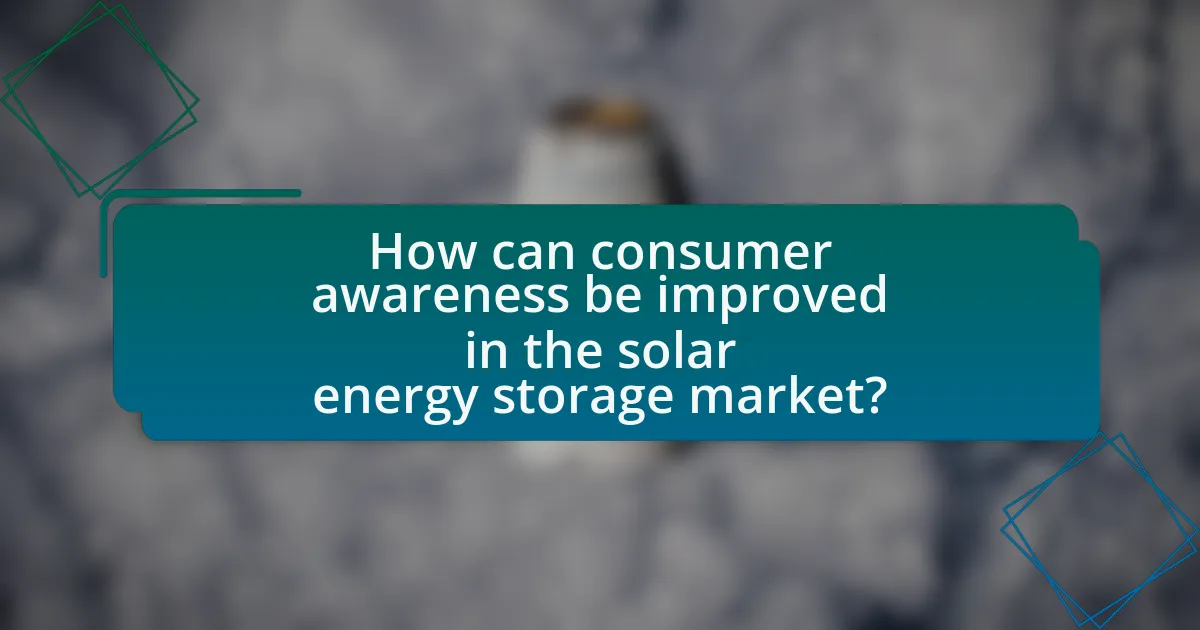

Consumer awareness in the solar energy storage market can be improved through targeted educational campaigns and transparent information dissemination. These initiatives should focus on providing clear, accessible information about the benefits, costs, and technologies associated with solar energy storage systems. Research indicates that consumers are more likely to engage with products when they understand their value; for instance, a study by the National Renewable Energy Laboratory found that informed consumers are 50% more likely to invest in renewable energy solutions. Additionally, leveraging social media platforms and community workshops can enhance outreach efforts, ensuring that potential customers receive accurate and relevant information.
What strategies can be implemented to enhance consumer education?
To enhance consumer education in the solar energy storage market, implementing targeted informational campaigns is essential. These campaigns can utilize various platforms, such as social media, webinars, and community workshops, to disseminate clear and concise information about solar energy storage benefits, technologies, and financial incentives. Research indicates that consumers are more likely to engage with educational content that is accessible and relatable, which can be achieved through storytelling and real-life case studies. For instance, a study by the National Renewable Energy Laboratory found that consumers who participated in educational workshops reported a 30% increase in understanding solar technologies. Additionally, partnerships with local organizations can help reach diverse audiences, ensuring that educational materials are culturally relevant and tailored to specific community needs.
How can online resources contribute to consumer education?
Online resources significantly enhance consumer education by providing accessible, up-to-date information about solar energy storage options. These resources include websites, online courses, and forums that offer detailed insights into product specifications, installation processes, and financial incentives. For instance, the U.S. Department of Energy’s Energy Saver website provides comprehensive guides on energy storage technologies, helping consumers make informed decisions. Additionally, platforms like SolarReviews aggregate user experiences and expert reviews, enabling potential buyers to compare products effectively. This wealth of information empowers consumers to understand their choices better, leading to more informed purchasing decisions in the solar energy storage market.
What role do community programs play in raising awareness?
Community programs play a crucial role in raising awareness by providing education and resources about solar energy storage options. These programs often facilitate workshops, informational sessions, and hands-on demonstrations that help consumers understand the benefits and functionalities of solar energy systems. For instance, a study by the National Renewable Energy Laboratory found that community engagement initiatives significantly increase consumer knowledge and adoption rates of renewable energy technologies. By fostering local discussions and sharing success stories, community programs effectively empower individuals to make informed decisions regarding solar energy storage, ultimately contributing to a more sustainable energy future.
What are the benefits of increased consumer awareness?
Increased consumer awareness leads to more informed purchasing decisions, resulting in higher demand for solar energy storage solutions. This heightened demand encourages manufacturers to innovate and improve product quality, ultimately driving down costs. According to a report by the International Renewable Energy Agency, informed consumers are more likely to invest in renewable technologies, which can lead to a 20% increase in market growth for solar energy solutions. Additionally, increased awareness fosters competition among providers, enhancing service offerings and customer satisfaction.
How does consumer awareness influence market growth?
Consumer awareness significantly influences market growth by driving demand for products and services, particularly in the solar energy storage sector. When consumers are informed about the benefits of solar energy storage, such as cost savings and environmental impact, they are more likely to invest in these technologies. Research indicates that increased consumer awareness can lead to a 20-30% rise in adoption rates for renewable energy solutions, as seen in various markets where educational campaigns have been implemented. This heightened demand encourages manufacturers to innovate and expand their offerings, further stimulating market growth.
What impact does informed consumer choice have on product quality?
Informed consumer choice significantly enhances product quality by driving manufacturers to meet higher standards. When consumers are educated about solar energy storage options, they tend to prefer products that offer better efficiency, durability, and performance. This demand compels companies to invest in research and development, leading to innovations and improvements in product design and materials. For instance, a study by the National Renewable Energy Laboratory found that increased consumer awareness in the solar market correlates with a rise in the adoption of high-quality, efficient technologies, ultimately benefiting the overall market by elevating product standards.
What resources are available for consumers in the solar energy storage market?
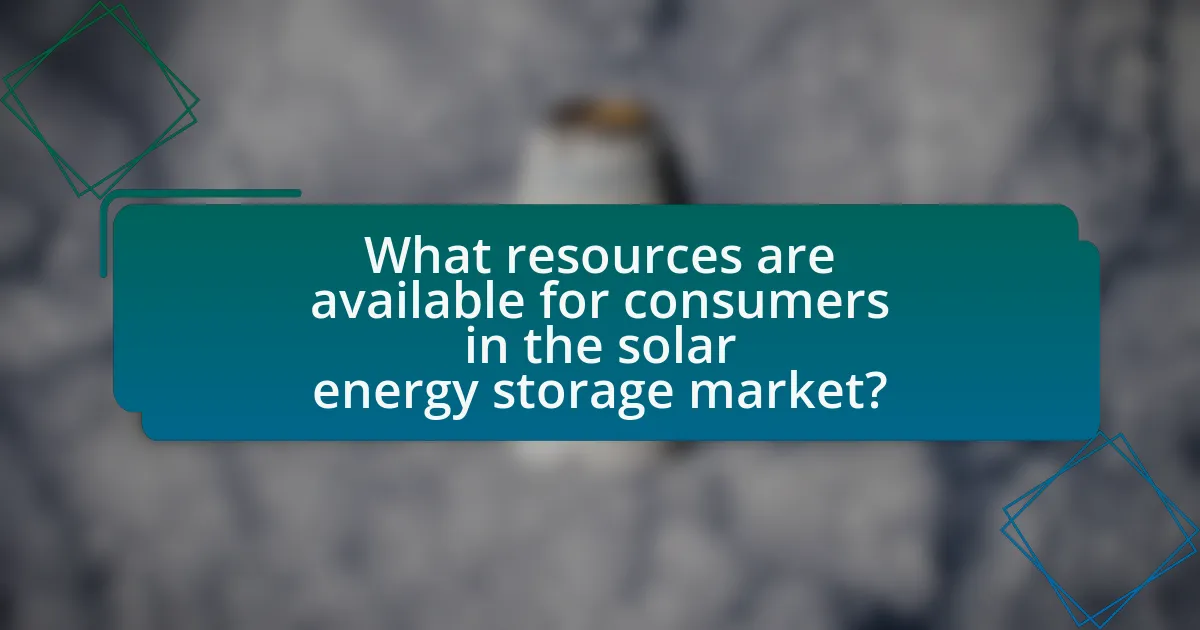

Consumers in the solar energy storage market have access to various resources, including government incentives, educational websites, and product comparison tools. Government programs, such as the Federal Investment Tax Credit, provide financial benefits for solar energy systems, which can include storage solutions. Educational websites like the U.S. Department of Energy’s Energy Saver and the Solar Energy Industries Association offer comprehensive information on solar storage technologies, benefits, and installation processes. Additionally, online platforms such as EnergySage and SolarReviews allow consumers to compare different solar storage products and read reviews, helping them make informed decisions. These resources collectively empower consumers to navigate the solar energy storage market effectively.
What types of educational materials are most effective for consumers?
Visual aids, such as infographics and videos, are the most effective educational materials for consumers in the solar energy storage market. These materials simplify complex information, making it easier for consumers to understand concepts like energy efficiency, system components, and financial incentives. Research indicates that visual content is processed 60,000 times faster than text, enhancing retention and comprehension. Additionally, interactive tools, such as calculators and quizzes, engage consumers actively, allowing them to apply knowledge to their specific situations, which further reinforces learning.
How can consumers access reliable information about solar energy storage?
Consumers can access reliable information about solar energy storage through reputable sources such as government websites, industry associations, and academic research. Government agencies like the U.S. Department of Energy provide comprehensive resources and guidelines on solar energy technologies, including storage options. Industry associations, such as the Solar Energy Industries Association, offer insights, reports, and educational materials that are vetted for accuracy. Additionally, peer-reviewed academic journals publish research studies that analyze the effectiveness and advancements in solar energy storage systems, ensuring that consumers receive scientifically validated information.
What role do industry certifications play in consumer education?
Industry certifications play a crucial role in consumer education by providing verified standards of quality and safety for solar energy storage products. These certifications help consumers make informed decisions by ensuring that products meet specific performance criteria and regulatory requirements. For instance, certifications from organizations like Underwriters Laboratories (UL) and the International Electrotechnical Commission (IEC) indicate that a product has undergone rigorous testing and complies with industry standards, thereby enhancing consumer trust and understanding of the technology.
What are some best practices for consumers when considering solar energy storage?
Consumers should evaluate their energy needs and usage patterns before investing in solar energy storage. Understanding how much energy is consumed daily helps in selecting the appropriate storage capacity. Additionally, researching different battery technologies, such as lithium-ion or lead-acid, is crucial, as each has distinct performance characteristics and lifespans.
Consumers should also consider the total cost of ownership, which includes installation, maintenance, and potential incentives or rebates available in their region. For instance, the Federal Investment Tax Credit (ITC) can significantly reduce upfront costs.
Furthermore, assessing the compatibility of storage systems with existing solar panels ensures optimal performance. Consumers should consult with certified solar energy professionals to obtain accurate assessments and recommendations tailored to their specific situations.
Finally, staying informed about advancements in solar technology and energy policies can empower consumers to make educated decisions that align with their long-term energy goals.
How can consumers assess their energy storage needs effectively?
Consumers can assess their energy storage needs effectively by evaluating their energy consumption patterns and determining the capacity required to meet their demands. This involves analyzing monthly electricity bills to identify peak usage times and total energy consumption, which helps in estimating the size of the storage system needed. Additionally, consumers should consider their energy goals, such as backup power during outages or maximizing solar energy usage, to tailor their storage solutions accordingly. Research indicates that understanding these factors can lead to more informed decisions, ultimately enhancing energy efficiency and cost savings.
What questions should consumers ask before purchasing a solar energy storage system?
Consumers should ask about the system’s capacity, efficiency, warranty, and compatibility with existing solar panels before purchasing a solar energy storage system. Understanding the capacity ensures that the system can meet energy needs, while efficiency ratings indicate how much energy can be stored and used effectively. A warranty provides insight into the manufacturer’s confidence in the product’s longevity and performance, typically ranging from 5 to 15 years. Compatibility with existing solar panels is crucial to ensure seamless integration and optimal performance. These questions help consumers make informed decisions and select a system that best fits their energy requirements and budget.
